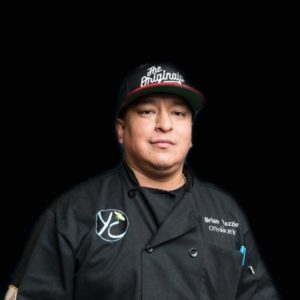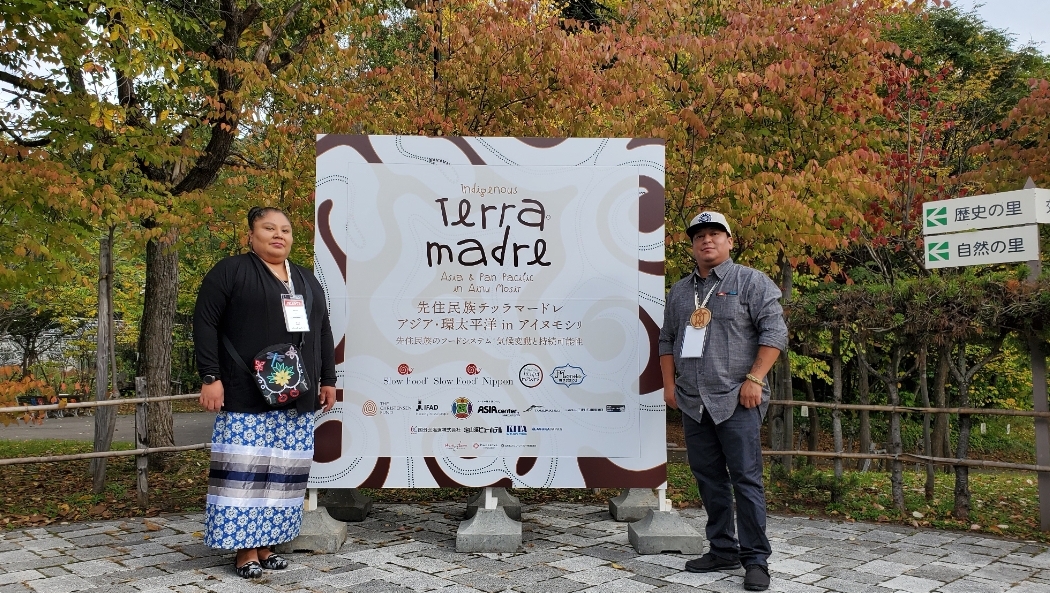Slow Food Leaders: Brian Yazzie
 Brian Yazzie is cooking a lot of different dishes these days, and all his pots are full of Indigenous foods. A member of the Navajo Nation, Brian now lives in Dakota Territory, St. Paul, Minnesota, and the common ingredient in all his work is the celebration and revalorization of native foods.
Brian Yazzie is cooking a lot of different dishes these days, and all his pots are full of Indigenous foods. A member of the Navajo Nation, Brian now lives in Dakota Territory, St. Paul, Minnesota, and the common ingredient in all his work is the celebration and revalorization of native foods.
During the summer, Brian is the resident chef at Dream of Wild Health, a Hugo, MN farm that works with inner city native youth to help restore health and well-being in the Native community by recovering knowledge of and access to healthy Indigenous foods, medicines and lifeways. Working four days a week on the farm, Brian cooks meals daily with participating youth using native foods such as Oneida white hominy corn, Dakota yellow flint corn, Hopi black beans, and many different squashes, kale, and collards.
Indigenous food sovereignty
A graduate of St. Paul College’s culinary arts program, Brian is also co-owner and chef of Intertribal Foodways, a catering company serving Native American cuisine that also offers cooking classes and chef demonstrations, all with a focus on Indigenous food sovereignty.
Brian is a member of the non-profit I-Collective, a group of Indigenous chefs, food scholars, foragers, farmers, hunters, and knowledge keepers working to highlight Indigenous contributions to gastronomy, agriculture, art, and society. Brian got involved with Slow Food two years ago as a Slow Food Turtle Island delegate to Terra Madre Salone del Gusto in Turin, Italy.
McDonalds, Italy Style
As a member of Slow Food, Brian has a surprising McDonald’s story to tell. He was running late for a Terra Madre event. He was a stranger in Italy, did not speak the language and hadn’t eaten or drunk his regular coffee. He needed food and he needed caffeine. He saw the familiar-looking McDonald’s, so he stopped in. And he was delighted. He drank fresh espresso, served with a small piece of tasty chocolate, ate a burger tasting of local meat, accompanied by fresh greens, on a bun that felt and tasted like it came from a gourmet shop, alongside fresh, not tired fries. Everything was fresh. This was a shock to Brian’s system — this unlikely embodiment of the ethos of Slow Food. A place where everything is fresh and everything is local. The more time Brian spent in Italy, dining in different restaurants and learning about the varied cuisines of northern and southern Italy, the more he confirmed that these values inform the food culture of the nation that birthed Slow Food. Ironically, inside that McDonalds, Brian had a Slow Food moment.
“This is the time and place for the Indigenous food movement. The Western perspective may see us as a trend or a fad, but we’ve always been here; we’ve just been overlooked. Not only did our ancestors survive colonization, but so did our ingredients.”
Empowering Indigenous Voices
When looking at Slow Food over the last 30 years, Brian points to its work empowering Indigenous voices and providing an inclusive platform for more authentic narratives about native foods and Indigenous food sovereignty. For Brian, natural allies in these causes are found in unlikely corners of the globe.
When he went to Japan for Indigenous Terra Madre, he and his colleagues were hosted for a cross-cultural exchange about food, language and culture by the Indigenous Ainu people. He did a cooking demonstration, but since he couldn’t bring fresh ingredients in his luggage, he relied on similar local foods. To his great surprise, he found a local variety of squash and recognized that somehow, a food native to the Americas had traveled all the way to Japan to be incorporated into another cuisine.
The Ainu people have lost many cultural and culinary traditions over the years. When fellow native chef Vincent Medina pulled out acorn flour to make his dish, Brian saw that the Ainu elders were brought to tears. He learned that acorns had been a food staple for their people before paddy rice was introduced and the acorn-producing trees disappeared. For all the losses that Brian’s people and his hosts had experienced, here was a moment of rediscovery and reconnection. This is exactly the type of celebration and revalorization that all of Brian Yazzie’s cooking and his work with Slow Food strives to achieve.

Brian Yazzie at indigenous Terra Madre Asia-Pan Pacific, held in Japan in October 2019.
